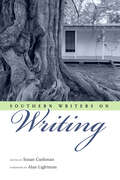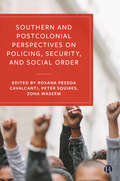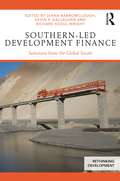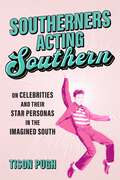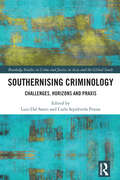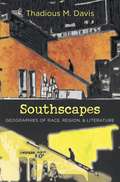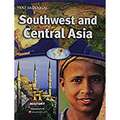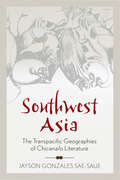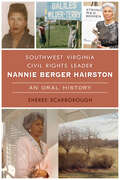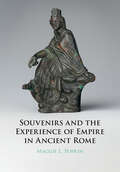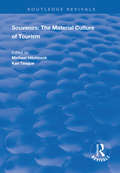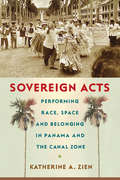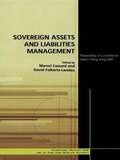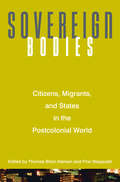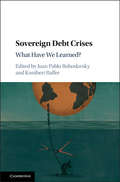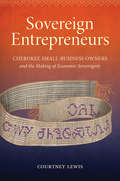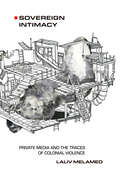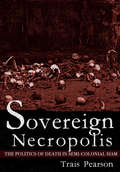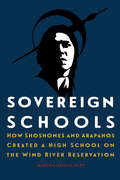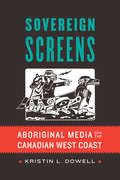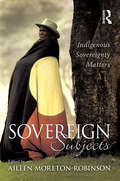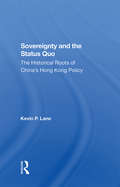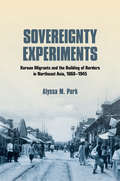- Table View
- List View
Southern Writers on Writing
by Susan CushmanContributions by Julie Cantrell, Katherine Clark, Susan Cushman, Jim Dees, Clyde Edgerton, W. Ralph Eubanks, John M. Floyd, Joe Formichella, Patti Callahan Henry, Jennifer Horne, Ravi Howard, Suzanne Hudson, River Jordan, Harrison Scott Key, Cassandra King, Alan Lightman, Sonja Livingston, Corey Mesler, Niles Reddick, Wendy Reed, Nicole Seitz, Lee Smith, Michael Farris Smith, Sally Palmer Thomason, Jacqueline Allen Trimble, M. O. Walsh, and Claude Wilkinson The South is often misunderstood on the national stage, characterized by its struggles with poverty, education, and racism, yet the region has yielded an abundance of undeniably great literature. In Southern Writers on Writing, Susan Cushman collects twenty-six writers from across the South whose work celebrates southern culture and shapes the landscape of contemporary southern literature. Contributors hail from Mississippi, Alabama, Louisiana, Tennessee, Georgia, South Carolina, North Carolina, Virginia, and Florida. Contributors such as Lee Smith, Michael Farris Smith, W. Ralph Eubanks, and Harrison Scott Key, among others, explore issues like race, politics, and family and the apex of those issues colliding. It discusses landscapes, voices in the South, and how writers write. The anthology is divided into six sections, including “Becoming a Writer;” “Becoming a Southern Writer;” “Place, Politics, People;” “Writing about Race;” “The Craft of Writing;” and “A Little Help from My Friends.”
Southern and Postcolonial Perspectives on Policing, Security and Social Order
by Roxana Pessoa Cavalcanti, Peter Squires and Zoha WaseemPostcolonial legacies continue to impact upon the Global South and this edited collection examines their influence on systems of policing, security management and social ordering. Expanding the Southern Criminology agenda, the book critically examines social harms, violence and war crimes, human rights abuses, environmental degradation and the criminalization of protest. The book asks how current states of policing came about, their consequences and whose interests they continue to serve through vivid international case studies, including prison struggles in Latin America and the misuse of military force. Challenging current criminological thinking on the Global South, the book considers how police and state overreach can undermine security and perpetuate racism and social conflict.
Southern-Led Development Finance: Solutions from the Global South (Rethinking Development)
by Kevin P. Gallagher Diana Barrowclough Richard Kozul-WrightSouthern-Led Development Finance examines some of the innovative new south-south financial arrangements and institutions that have emerged in recent years, as countries from the Global South seek to transform their economies and to shield themselves from global economic turbulence. Even before the Covid-19 crisis, it was clear to many that the global economy needed a reset and a massive increase in public investment. In the last decade southern-owned development banks, infrastructure funds, foreign exchange reserve funds and Sovereign Wealth Funds have doubled the amount of long-term finance available to developing countries. Now, as the world considers what a post-Covid-19 future will look like, it is clear that Southern-led institutions will do much of the heavy lifting. This book brings together insights from theory and practice, incorporating the voices of bankers, policymakers and practitioners alongside international academics. It covers the most significant new initiatives stemming from Asia, tried and tested examples in Latin America and in Africa, and the contribution of advanced economies. Whilst the book highlights the potential for Southern-led initiatives to change the global financial landscape profoundly, it also shows their varied impacts and concludes that more is needed for development than just the technical availability of funds. As governments and businesses become frustrated by the traditional North-dominated mechanisms and international financial system, this book argues that southern-led development finance will play an important role in the search for more inclusive, equitable and sustainable patterns of investment, trade and growth in the post-Covid landscape. It will be of interest to practitioners, policy makers, researchers and students working on development and finance everywhere.
Southerners Acting Southern: On Celebrities and Their Star Personas in the Imagined South (Southern Literary Studies)
by Tison PughWhat is the difference between a star born in the South and a “southern star”? In Southerners Acting Southern, Tison Pugh answers this intriguing question, pondering the ways in which some performers from the South metamorphose into southern stars by accentuating their geographic and cultural roots as key aspects of their star personas. Many celebrities, particularly actors, seek to transcend their hometown roots in favor of achieving an “all-American” appeal, but some stars born in the South build their national and international fan base by emphasizing the southern aspects of their biography and by leaning into regional clichés and stereotypes that percolate throughout the U.S. cultural imaginary. In turn, some southern stars trot out the region’s hoariest tropes of fading belles, gullible country rubes, and the succors of southern hospitality only to reveal the shallowness of these stereotypes and of their celebrity personas as well. Covering more than one hundred years of cultural history, Southerners Acting Southern allows readers to gauge the South’s often-reluctant progress into modernity, including discussions on the intersection of race and celebrity for the region’s Black stars and its increasing, if hesitant, embrace of queer ones. Chapters feature a wide-ranging selection of southern celebrities, including Louis Armstrong, Truman Capote, Elvis Presley, Tennessee Williams, Andy Griffith, Tina Turner, Dolly Parton, Tom Petty, Gloria Estefan, Oprah Winfrey, Reese Witherspoon, Jenna Bush Hager, Ellen DeGeneres, Tyler Perry, Matthew McConaughey, Aziz Ansari, and Miley Cyrus.Southerners Acting Southern moves from past to present, from musicians to media personalities, discerning the ways in which southernness contributes to the building of personal celebrity. Altogether, this luminous work of cultural criticism reveals that southern stargazing, as much as it might initially appear a flighty pastime of overzealous fans, divulges deeper truths about the South, and the United States as a whole, that might otherwise pass unnoticed.
Southernising Criminology: Challenges, Horizons and Praxis (Routledge Studies in Crime and Justice in Asia and the Global South)
by Luiz Dal Santo Carla Sepúlveda PennaThis book introduces the ‘Southern criminology’ movement; explores its theoretical, methodological, and philosophical tools; offers analytical accounts on the development of criminological thoughts in marginalised regions; and showcases the cutting edge of criminological research from Southern settings.Southernising Criminology is structured into three parts. The first part provides theoretical and methodological insights into how criminology can be Southernised, including renowned social scientists who share concerns for the need to reconceptualise the centre, the periphery, and their relations. The second part brings the reader up-to-date with the state of criminological research in different parts of the world and how far this landscape has changed when introducing Southern perspectives. The third part shows first-hand examples of how Southern criminology is done, with its challenges and transformative potential for criminological knowledge. Bringing together contributions from leading scholars working across the five continents and drawing on issues such as state criminality, violent crime, criminal justice practices, and state and non-state punishment, this book offers a critical account of the problems of metropolitan thinking, colonial and imperial power relations, and Western ethnocentric approaches to criminology. It offers a nuanced and grounded reflection on how things are being done differently and why that is important.An accessible and compelling read, this book will appeal to students and scholars of criminology, sociology, politics, and policy makers from around the world who are interested in the field of criminology and are aware of the urgent need for it to be decolonised and democratised.
Southscapes
by Thadious M. DavisIn this innovative approach to southern literary cultures, Thadious Davis analyzes how black southern writers use their spatial location to articulate the vexed connections between society and environment, particularly under segregation and its legacies. Basing her analysis on texts by Ernest Gaines, Richard Wright, Alice Walker, Natasha Trethewey, Olympia Vernon, Brenda Marie Osbey, Sybil Kein, and others, Davis reveals how these writers reconstitute racial exclusion as creative black space, rather than a site of trauma and resistance. Utilizing the social and political separation epitomized by segregation to forge a spatial and racial vantage point, Davis argues, allows these writers to imagine and represent their own subject matter and aesthetic concerns. Focusing particularly on Louisiana and Mississippi, Davis deploys new geographical discourses of space to expand analyses of black writers' relationship to the South and to consider the informing aspects of spatial narratives on their literary production. She argues that African American writers not only are central to the production of southern literature and new southern studies, but also are crucial to understanding the shift from modernism to postmodernism in southern letters. A paradigm-shifting work, Southscapes restores African American writers to their rightful place in the regional imagination, while calling for a more inclusive conception of region.
Southwell and Nottinghamshire: Medieval Art, Architecture, and Industry: The British Archaeological Assocation Conference Transactions Vol. 21 (The British Archaeological Association Conference Transactions)
by Jennifer AlexanderThis book contains new research on Southwell Minster and presents new information on other aspects of the county's architecture and archaeology. It is based on a conference held between 15 and 19 July 1995, based at the International Co-operative College, Stanford Hall, Loughborough, Leicestershire.
Southwest And Central Asia
by Holt McdougalThe Student Edition combines a highly visual approach with primary sources to help all students understand world geography and make global connections. High-interest, engaging visuals and interactive technology help make geography accessible to all students.
Southwest Asia: The Transpacific Geographies of Chicana/o Literature
by Jayson Gonzales Sae-SaueChicana/o literature is justly acclaimed for the ways it voices opposition to the dominant Anglo culture, speaking for communities ignored by mainstream American media. Yet the world depicted in these texts is not solely inhabited by Anglos and Chicanos; as this groundbreaking new book shows, Asian characters are cast in peripheral but nonetheless pivotal roles. Southwest Asia investigates why key Chicana/o writers, including Américo Paredes, Rolando Hinojosa, Oscar Acosta, Miguel Méndez, and Virginia Grise, from the 1950s to the present day, have persistently referenced Asian people and places in the course of articulating their political ideas. Jayson Gonzales Sae-Saue takes our conception of Chicana/o literature as a transnational movement in a new direction, showing that it is not only interested in North-South migrations within the Americas, but is also deeply engaged with East-West interactions across the Pacific. He also raises serious concerns about how these texts invariably marginalize their Asian characters, suggesting that darker legacies of imperialism and exclusion might lurk beneath their utopian visions of a Chicana/o nation. Southwest Asia provides a fresh take on the Chicana/o literary canon, analyzing how these writers have depicted everything from interracial romances to the wars Americans fought in Japan, Korea, and Vietnam. As it examines novels, plays, poems, and short stories, the book makes a compelling case that Chicana/o writers have long been at the forefront of theorizing U.S.-Asian relations.
Southwest Virginia Civil Rights Leader Nannie Berger Hairston: An Oral History (American Heritage)
by Sheree ScarboroughNannie Berger Hairston was a crusader for justice in twentieth-century Virginia. Nannie Berger Hairston was born in West Virginia in 1921, half a century after the end of the Civil War. She attended segregated schools, graduated, married and started a family. When Nannie’s husband, John, lost his job in the coal mine, the Hairstons moved to Southwest Virginia. It was the height of Jim Crow, and yet, against great odds, she and John became leaders in the community, advocating for civil rights and social justice. Nannie Hairston’s advice was sought by the powerless as well as the powerful. At the time of her death in 2017, she had taken her place as an icon for truth, justice and love. Local author Sheree Scarborough uses Nannie Hairston’s own words to tell her story.
Souvenirs and the Experience of Empire in Ancient Rome
by Maggie PopkinIn this book, Maggie Popkin offers an in-depth investigation of souvenirs, a type of ancient Roman object that has been understudied and that is unfamiliar to many people. Souvenirs commemorated places, people, and spectacles in the Roman Empire. Straddling the spheres of religion, spectacle, leisure, and politics, they serve as a unique resource for exploring the experiences, interests, imaginations, and aspirations of a broad range of people - beyond elite, metropolitan men - who lived in the Roman world. Popkin shows how souvenirs generated and shaped memory and knowledge, as well as constructed imagined cultural affinities across the empire's heterogeneous population. At the same time, souvenirs strengthened local identities, but excluded certain groups from the social participation that souvenirs made available to so many others. Featuring a full illustration program of 137 color and black and white images, Popkin's book demonstrates the critical role that souvenirs played in shaping how Romans perceived and conceptualized their world, and their relationships to the empire that shaped it.
Souvenirs: The Material Cultre of Tourism (Routledge Revivals)
by Michael Hitchcock Ken TeagueThis title was first published in 2000: Souvenirs, broadly conceived, are generally thought to be the material counterpart of travels, events, relationships and memories of all kinds. The material items classed as souvenirs discussed in this text have memorial functions, usually connected with the owner's travels. But not all of the items are souvenirs of tourism; they are also souvenirs of other past phenomena, such as political events (suffragettes), colonial history (India), former artistic pre-eminence (Awaji Ningyo puppetry) or former ways of life (South American ceramic archaisms). The authors do not necessarily focus on material souvenirs in their memorial function as prompters of memory. They also use their case studies as starting points for the discussion of many interesting contemporary phenomena, such as cottage industries for economic development in Mexico and Ainu, as devices to invigorate or maintain artistic practices, as emblems of cultural conformity (Surrealists) or as symbolic weapons in national and international political arguments. A key focus of many of the chapters is the question of meaning: what is the meaning of any particular souvenir or collection, and for whom does it bear that meaning?
Sovereign Acts: Performing Race, Space, and Belonging in Panama and the Canal Zone
by Katherine A. ZienSovereign Acts explores how artists, activists, and audiences performed and interpreted sovereignty struggles in the Panama Canal Zone, from the Canal Zone’s inception in 1903 to its dissolution in 1999. In popular entertainments and patriotic pageants, opera concerts and national theatre, white U.S. citizens, West Indian laborers, and Panamanian artists and activists used performance as a way to assert their right to the Canal Zone and challenge the Zone’s sovereignty, laying claim to the Zone’s physical space and imagined terrain. By demonstrating the place of performance in the U.S. Empire’s legal landscape, Katherine A. Zien transforms our understanding of U.S. imperialism and its aftermath in the Panama Canal Zone and the larger U.S.-Caribbean world.
Sovereign Assets And Liabilities Management
by Marcel CassardThe papers contained in this publication were presented at an International Monetary Fund organised conference held in Hong Kong in 1996. The conference focused on a wide range of issues confronting policy makers in managing their sovereign assets and liabilities in a world of mobile capital and integrated capital markets. These issues included: the strategy of public debt management; the management of central bank reserves; the technical and quantitative aspects of risk management; and credit costs and borrowing capacity in debt organisation. The papers also describe the experience of various countries in managing their own sovereign assets and liabilities. These experiences are drawn from policy makers and private sector participants who have been actively involved in formulating and implementing national debt and reserves policies.
Sovereign Attachments: Masculinity, Muslimness, and Affective Politics in Pakistan
by Shenila Khoja-MooljiSovereign Attachments rethinks sovereignty by moving it out of the exclusive domain of geopolitics and legality and into cultural, religious, and gender studies. Through a close reading of a stunning array of cultural texts produced by the Pakistani state and the Pakistan-based Taliban, Shenila Khoja-Moolji theorizes sovereignty as an ongoing attachment that is negotiated in public culture. Both the state and the Taliban recruit publics into relationships of trust, protection, and fraternity by summoning models of Islamic masculinity, mobilizing kinship metaphors, and marshalling affect. In particular, masculinity and Muslimness emerge as salient performances through which sovereign attachments are harnessed. The book shifts the discussion of sovereignty away from questions about absolute dominance to ones about shared repertoires, entanglements, and co-constitution.
Sovereign Bodies: Citizens, Migrants, and States in the Postcolonial World
by Thomas Blom Hansen & Finn Stepputat9/11 and its aftermath have shown that our ideas about what constitutes sovereign power lag dangerously behind the burgeoning claims to rights and recognition within and across national boundaries. New configurations of sovereignty are at the heart of political and cultural transformations globally. Sovereign Bodies shifts the debate on sovereign power away from territoriality and external recognition of state power, toward the shaping of sovereign power through the exercise of violence over human bodies and populations. In this volume, sovereign power, whether exercised by a nation-state or by a local despotic power or community, is understood and scrutinized as something tentative and unstable whose efficacy depends less on formal rules than on repeated acts of violence. Following the editors' introduction are fourteen essays by leading scholars from around the globe that analyze cultural meanings of sovereign power and violence, as well as practices of citizenship and belonging--in South Africa, Peru, India, Mexico, Cyprus, Norway, and also among transnational Chinese and Indian populations. Sovereign Bodies enriches our understanding of power and sovereignty in the postcolonial world and in "the West" while opening new conceptual fields in the anthropology of politics. The contributors are Ana María Alonso, Lars Buur, Partha Chatterjee, Jean Comaroff and John L. Comaroff, Oivind Fuglerud, Thomas Blom Hansen, Barry Hindess, Steffen Jensen, Achille Mbembe, Aihwa Ong, Finn Stepputat, Simon Turner, Peter van der Veer, and Yael Navaro-Yashin.
Sovereign Debt Crises: What Have We Learned?
by Juan Pablo Bohoslavsky Kunibert RafferThere is an obvious need to learn more about why some countries succeed and others fail when dealing with debt crises. Why do some sovereign debtors overcome economic problems very quickly and at minor human rights costs for their people, while others remain trapped by debts for years struggling with overwhelming debt burdens and exacerbating economic problems and human suffering? This book analyzes fourteen unique or singular country cases of sovereign debt problems that differ characteristically from the 'ordinary' debtor countries, and have not yet received enough or proper attention - some regarded as successful, some as unsuccessful in dealing with debt crises. The aim is to contribute to a better understanding of the policy options available to countries struggling with debt problems, or how to resolve a debt overhang while protecting human rights, the Rule of Law and the debtor's economic recovery.
Sovereign Entrepreneurs: Cherokee Small-Business Owners and the Making of Economic Sovereignty (Critical Indigeneities)
by Courtney LewisBy 2009, reverberations of economic crisis spread from the United States around the globe. As corporations across the United States folded, however, small businesses on the Qualla Boundary of the Eastern Band of Cherokee Indians (EBCI) continued to thrive. In this rich ethnographic study, Courtney Lewis reveals the critical roles small businesses such as these play for Indigenous nations. The EBCI has an especially long history of incorporated, citizen-owned businesses located on their lands. When many people think of Indigenous-owned businesses, they stop with prominent casino gaming operations or natural-resource intensive enterprises. But on the Qualla Boundary today, Indigenous entrepreneurship and economic independence extends to art galleries, restaurants, a bookstore, a funeral parlor, and more.Lewis's fieldwork followed these businesses through the Great Recession and against the backdrop of a rapidly expanding EBCI-owned casino. Lewis's keen observations reveal how Eastern Band small business owners have contributed to an economic sovereignty that empowers and sustains their nation both culturally and politically.
Sovereign Intimacy: Private Media and the Traces of Colonial Violence
by Laliv MelamedIn the early 1990s, Israeli television began dedicating Memorial Day airtime to videos produced by the grieving families of soldiers killed in the line of duty. When these videos first appeared, during a period of growing Israeli discontent with the occupation of southern Lebanon, they were widely perceived as a challenge to the state, reclaiming the dead from Israel’s militaristic memory culture by resituating them in intimate domestic contexts via mediated commemorations. By tracing an emerging media system of freelance filmmaking, privatized television, state institutes of care, and grassroots campaigns, Laliv Melamed reveals how these videos nevertheless avoid a fundamental critique of Israeli militarism, which is instead invited into the familiar space of the home. These intimate connections of memory and media exploit bonds of kinship and reshape larger relationships between the state and its citizens, enabling a collective disavowal of colonial violence. In Sovereign Intimacy, Melamed offers a poignant and critical view of the weaponization of home media and mourning in service of the neoliberal settler state.
Sovereign Necropolis: The Politics of Death in Semi-Colonial Siam
by Trais PearsonBy the 1890s, Siam (Thailand) was the last holdout against European imperialism in Southeast Asia. But the kingdom's exceptional status came with a substantial caveat: Bangkok, its bustling capital, was a port city that was subject to many of the same legal and fiscal constraints as other colonial treaty ports. Sovereign Necropolis offers new insight into turn-of-the-century Thai history by disinterring the forgotten stories of those who died "unnatural deaths" during this period and the work of the Siamese state to assert their rights in a pluralistic legal arena.Based on a neglected cache of inquest files compiled by the Siamese Ministry of the Capital, official correspondence, and newspaper accounts, Trais Pearson documents the piecemeal introduction of new forms of legal and medical concern for the dead. He reveals that the investigation of unnatural death demanded testimony from diverse strata of society: from the unlettered masses to the king himself. These cases raised questions about how to handle the dead—were they spirits to be placated or legal subjects whose deaths demanded compensation?—as well as questions about jurisdiction, rights, and liability.Exhuming the history of imperial politics, transnational commerce, technology, and expertise, Sovereign Necropolis demonstrates how the state's response to global flows transformed the nature of legal subjectivity and politics in lasting ways. A compelling exploration of the troubling lives of the dead in a cosmopolitan treaty port, the book is a notable contribution to the growing corpus of studies in science, law, and society in the non-Western world.
Sovereign Schools: How Shoshones and Arapahos Created a High School on the Wind River Reservation
by Martha Louise HippSovereign Schools tells the epic story of one of the early battles for reservation public schools. For centuries indigenous peoples in North America have struggled to preserve their religious practices and cultural knowledge by educating younger generations but have been thwarted by the deeply corrosive effects of missionary schools, federal boarding schools, Bureau of Indian Affairs reservation schools, and off-reservation public schools. Martha Louise Hipp describes the successful fight through sustained Native community activism for public school sovereignty during the late 1960s and 1970s on the Shoshone and Arapaho tribes’ Wind River Indian Reservation in Wyoming. Parents and students at Wind River experienced sustained educational discrimination in their school districts, particularly at the high schools located in towns bordering the reservation, not least when these public schools failed to incorporate history and culture of the Shoshones and Arapahos into the curriculum. Focusing on one of the most significant issues of indigenous activism of the era, Sovereign Schools tells the story of how Eastern Shoshones and Northern Arapahos asserted tribal sovereignty in the face of immense local, state, and federal government pressure, even from the Nixon administration itself, which sent mixed signals to reservations by promoting indigenous “self-determination” while simultaneously impounding federal education funds for Native peoples. With support from the Coalition of Indian Controlled School Boards and the Episcopal Church, the Wind River peoples overcame federal and local entities to reclaim their reservation schools and educational sovereignty.
Sovereign Screens: Aboriginal Media on the Canadian West Coast
by Kristin L. DowellWhile Indigenous media have gained increasing prominence around the world, the vibrant Aboriginal media world on the Canadian West Coast has received little scholarly attention. As the first ethnography of the Aboriginal media community in Vancouver, Sovereign Screens reveals the various social forces shaping Aboriginal media production including community media organizations and avant-garde art centers, as well as the national spaces of cultural policy and media institutions.Kristin L. Dowell uses the concept of visual sovereignty to examine the practices, forms, and meanings through which Aboriginal filmmakers tell their individual stories and those of their Aboriginal nations and the intertribal urban communities in which they work. She explores the ongoing debates within the community about what constitutes Aboriginal media, how this work intervenes in the national Canadian mediascape, and how filmmakers use technology in a wide range of genres—including experimental media—to recuperate cultural traditions and reimagine Aboriginal kinship and sociality. Analyzing the interactive relations between this social community and the media forms it produces, Sovereign Screens offers new insights into the on-screen and off-screen impacts of Aboriginal media.
Sovereign Subjects: Indigenous sovereignty matters
by Aileen Moreton-Robinson; Rachel Fensham; Jon StrattonIndigenous rights in Australia are at a crossroads. Over the past decade, neo-liberal governments have reasserted their claim to land in Australia, and refuse to either negotiate with the Indigenous owners or to make amends for the damage done by dispossession. Many Indigenous communities are in a parlous state, under threat both physically and culturally.In Sovereign Subjects some of Indigenous Australia's emerging and well-known critical thinkers examine the implications for Indigenous people of continuing to live in a state founded on invasion. They show how for Indigenous people, self-determination, welfare dependency, representation, cultural maintenance, history writing, reconciliation, land ownership and justice are all inextricably linked to the original act of dispossession by white settlers and the ongoing loss of sovereignty.At a time when the old left political agenda has run its course, and the new right is looking increasingly morally bankrupt, Sovereign Subjects sets a new rights agenda for Indigenous politics and Indigenous studies.
Sovereignty And The Status Quo: The Historical Roots Of China's Hong Kong Policy
by Kevin P. LaneKevin Lane discusses the tension existed between China's traditional claim to sovereignty over Hong Kong. He believes that on historical track record China has the capacity for flexibility on Hong Kong that would enable arrangements about its future to work successfully.
Sovereignty Experiments: Korean Migrants and the Building of Borders in Northeast Asia, 1860–1945 (Studies of the Weatherhead East Asian Institute, Columbia University)
by Alyssa M. ParkSovereignty Experiments tells the story of how authorities in Korea, Russia, China, and Japan—through diplomatic negotiations, border regulations, legal categorization of subjects and aliens, and cultural policies—competed to control Korean migrants as they suddenly moved abroad by the thousands in the late nineteenth century. Alyssa M. Park argues that Korean migrants were essential to the process of establishing sovereignty across four states because they tested the limits of state power over territory and people in a borderland where authority had been long asserted but not necessarily enforced. Traveling from place to place, Koreans compelled statesmen to take notice of their movement and to experiment with various policies to govern it. Ultimately, states' efforts culminated in drastic measures, including the complete removal of Koreans on the Soviet side. As Park demonstrates, what resulted was the stark border regime that still stands between North Korea, Russia, and China today.Skillfully employing a rich base of archival sources from across the region, Sovereignty Experiments sets forth a new approach to the transnational history of Northeast Asia. By focusing on mobility and governance, Park illuminates why this critical intersection of Asia was contested, divided, and later reimagined as parts of distinct nations and empires. The result is a fresh interpretation of migration, identity, and state making at the crossroads of East Asia and Russia.
